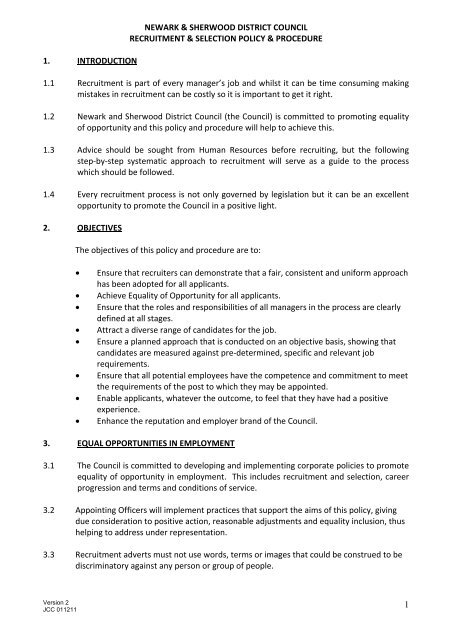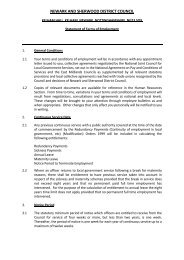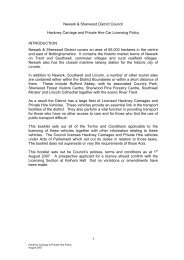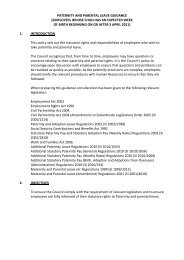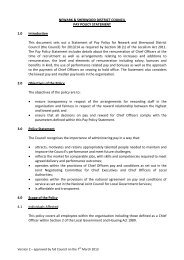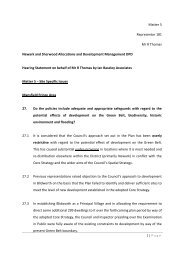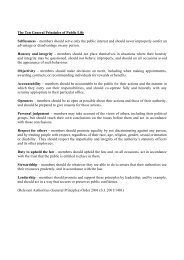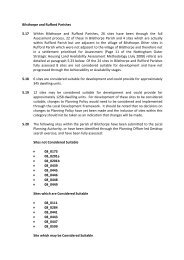Recruitment and Selection Policy - Newark and Sherwood District ...
Recruitment and Selection Policy - Newark and Sherwood District ...
Recruitment and Selection Policy - Newark and Sherwood District ...
You also want an ePaper? Increase the reach of your titles
YUMPU automatically turns print PDFs into web optimized ePapers that Google loves.
5.3 For vacancies at Director level <strong>and</strong> above advice should be sought from HR <strong>and</strong> referencemade to the Council’s constitution.5.4 Appointing Officers must ensure they have completed the Council’s <strong>Recruitment</strong> <strong>and</strong><strong>Selection</strong> training course. Any officer involved in the recruitment process who has notcompleted the course will be able to participate on an interview panel provided the chairof the recruitment panel has been trained.6 VACANCIES6.1 Ask yourself if the job is still needed or if it could be done more effectively by reallocatingor reorganising the work.6.2 Consider any changes in legislation <strong>and</strong> different working practices such as job share orpart‐time.6.3 Consider these questions: Can efficiencies savings be made? Has the job changed? What are the priorities? What are the objectives? What are the main duties <strong>and</strong> responsibilities? What skills, knowledge, experience <strong>and</strong> qualities are needed? Do you need to change or re‐write the Job Description in which case there may be JEimplications.6.4 A good Job Description <strong>and</strong> Person Specification will help you throughout the fullrecruitment process <strong>and</strong> save you time overall.6.5 The Council’s Constitution states that appointment of officers below Director is theresponsibility of the Director to whom the officer will report or his/her nominee.6.6 For appointment of Directors <strong>and</strong> above, advice should be sought from HR <strong>and</strong> referencemade to the Council’s Constitution.6.7 Directors have delegated authority to approve all permanent/temporary/reliefappointments within the current establishment.6.8 For posts in addition to the current establishment outside of existing budget parametersapproval should be sought via Cabinet.6.9 From time to time additional controls for the recruitment process may be required <strong>and</strong>you will be advised of these by HR.6.10 Once appropriate approval has been obtained, the line manager should liaise with HR toagree where the post is to be advertised.6.11 Normally, all posts with the exception of restructuring, internal secondments <strong>and</strong>redeployment on grounds of ill‐health or redundancy, will be advertised externally.However, internal advertisements may be justified in certain circumstances subject toVersion 2JCC 0112113
the prior approval of CMT or in exceptional circumstances e.g. where the Council ismaking redundancies. When a temporary position becomes permanent the post will beadvertised internally in the first instance. If no appointment is made, the post will thenbe advertised externally.6.12 Agency workers will not be permitted to apply for any vacancies that occur as the resultof a restructure which could lead to redundancies, or where there are employees “AtRisk” of redundancy within the Council.7. JOB DESCRIPTION7.1 The Job Description records the main purpose of the job, with the main tasks <strong>and</strong>outlining the duties <strong>and</strong> responsibilities.7.2 It is important to ensure that the Job Description is up to date <strong>and</strong> saved in the correctcorporate format. If a job description does not currently exist one will need to beproduced using the template job description available from HR. If there are significantchanges to the Job Description you should contact HR as the post may need to be reevaluatedto determine whether the grading is affected by the changes.8. PERSON SPECIFICATION8.1 This document is the key to getting the right person for the job (sample at Appendix A).Its importance cannot be emphasised enough. The Person Specification will inform yourshort list <strong>and</strong> provide the framework to structure the interview.8.2 The person who has direct management responsibility for the job must create the PersonSpecification.8.3 There must be a Person Specification for each job. It should be in the corporate formatwith the correct headings.8.4 It should contain the minimum essential <strong>and</strong> desirable criteria required for the job –essential means that the post holder must have these attributes, <strong>and</strong> desirable meansthat the post holder could have these extra attributes to enhance job performance it isnot a “wish list”!8.5 When selecting criteria you should ensure that it is possible to assess the criteria in someway. To do this, think about how you will decide whether or not a person meets thecriteria from their application ‐ by a test, at the interview, by producing certificates orreferences.8.6 The criteria should be relevant to the job <strong>and</strong> must not be discriminatory. Be careful notto set unnecessarily high st<strong>and</strong>ards for qualifications, length of experience or skills.Consider equivalent qualifications or equivalent experience.8.7 Do not make assumptions that the job has to be done in a certain way. State therequirement <strong>and</strong> let the person demonstrate to you how they can meet it. For example,do not say ‘must have a driving licence’, instead say ‘must be able to travel within the<strong>District</strong>’.Version 2JCC 0112114
8.8 Do not change the Person Specification once the recruitment process begins, unless youare making a reasonable adjustment for a disabled c<strong>and</strong>idate.9. ADVERTISEMENT9.1 A good advert is not measured by the number of applications it attracts but by its successin attracting one or more suitable applicants.9.2 The advert must be clear, concise, correct, in plain English <strong>and</strong> non discriminatory.9.3 It should reflect the requirements of the job, highlighting essential elements of the JobDescription <strong>and</strong> Person Specification, giving the reader the opportunity to self select.9.4 The advert should include:Business Unitlocationjob titlesalary <strong>and</strong> other benefitshours of work <strong>and</strong> any working patterns/arrangementskey responsibilities of the jobessential qualifications, skills <strong>and</strong> experience required (as detailed in the personspecification)the procedure for applyingan address, telephone numbera closing datedetails of any political restrictionsan interview date, if possiblewhether a Criminal Record check (through the Criminal Records Bureau) will berequired.9.5 The advert must not include:discriminatory language (e.g. “young, energetic man”)jargon (e.g. NSDC, LGPS)unnecessary or misleading information.9.6 Any employees in a potential redundancy or redeployment situation will be notified ofvacancies before they are advertised so that they where appropriate they can be givenprior consideration. In circumstances where there are a number of staff that are ‘at risk’where appropriate vacancies will in the first instance be advertised to ‘at risk’ personnelbefore being opened up to other staff within the Council to apply.9.7 Following consultation with HR in some circumstances, for example where an individualhas been in post on a temporary basis for a significant period of time, vacancies may beadvertised with “preferred c<strong>and</strong>idate” identified. This does not however, prevent otheremployees from applying for the post.9.8 All applicants will be required to complete the Council’s st<strong>and</strong>ard application form. CV’swill only be accepted if submitted with a fully completed application form.Version 2JCC 0112115
10. SHORT‐LISTING10.1 After the closing date HR will send the file of applicants to the relevant manager. The fileshould be treated as confidential, stored in a secure place <strong>and</strong> restricted to thoseinvolved in the recruitment to that vacancy.10.2 A minimum of two Officers should conduct the short‐listing procedure.10.3 The Appointing Officer will ensure employees who are “at risk” of redundancy or undernotice of termination on the grounds of redundancy are given prior considerationprovided they meet the essential criteria or could do so with the appropriate training,development <strong>and</strong> support within a reasonable timeframe.10.4 Short‐listing should be carried out systematically. The Appointing Officer has aresponsibility to ensure that only the criteria stated on the Person Specification is usedfor short listing purposes <strong>and</strong> that the same criteria is applied to all applicants.10.5 Applicants who disclose their disabilities (as defined under the Equality Act 2010) at thetime of application will be guaranteed an interview provided they can demonstrate thatthey meet the essential criteria of the post. This is in accordance with the Two Ticks‘Positive about Disability’ scheme. HR will advise you if this is the case. For advice aboutdisability legislation <strong>and</strong> the requirement to make reasonable adjustments contact HR.10.6 In some instances there may be a case for taking “positive action” to attract c<strong>and</strong>idatesfrom under‐represented groups. You will be advised if this is the case <strong>and</strong> HR will assistyou with the process.10.7 As part of the recruitment <strong>and</strong> assessment process you are required to keep a writtenrecord of the reason for rejecting/selecting applicants, details of which should bereturned to HR for retention on the recruitment file.10.8 Unsuccessful applicants will be informed of the Council’s intention to hold information onfile for a period of 6 months after a successful appointment has been made, thus allowingthem the opportunity to request their details be removed <strong>and</strong> destroyed.10.9 Once short‐listing has been completed, a Short‐listed C<strong>and</strong>idates Form must becompleted for each vacancy <strong>and</strong> sent to HR BEFORE the date of the interviews.10.10 Short‐listed c<strong>and</strong>idates should be given at least seven days’ notice of the interview dateunless the date has previously been given in the advert or information pack (sample‘Invite to Interview’ letter attached – Appendix B).*NOTE: Under the Officer Employment Procedure Rules Members should not be involvedin appointments below Director level.11. THE SELECTION PROCESS11.1 <strong>Newark</strong> <strong>and</strong> <strong>Sherwood</strong> <strong>District</strong> Council is committed to ensuring that all employees or jobapplicants will only be assessed according to their capability to carry out a given job,based on justifiable, objective criteria which are clearly related to the duties of the JobDescription <strong>and</strong> Person Specification.Version 2JCC 0112116
11.2 A minimum of two Officers should form the interview panel. Separate advice should besought from HR regarding the composition of the appointment panel for Director posts.11.3 Only officers who have undertaken the Council’s <strong>Recruitment</strong> <strong>and</strong> <strong>Selection</strong> Training arepermitted to participate on an interview panel. Any manager who has not completed thecourse will be able to participate on an interview panel provided the chair has beentrained.11.4 Interviews should be carried out systematically <strong>and</strong> the Appointing Officer is responsiblefor ensuring that the assessments/interviews are chaired effectively <strong>and</strong> conducted fairlywith equal treatment of all c<strong>and</strong>idates. All c<strong>and</strong>idates must be subjected to the sameselection process using the Person Specification <strong>and</strong> any other agreed criteria (forexample, presentations, tests etc).11.5 The Council are committed to the highest st<strong>and</strong>ards of practice in the use of all tests tomaximise the benefit of testing to the Authority <strong>and</strong> the individual, <strong>and</strong> to promotefairness <strong>and</strong> equality of opportunity for all.11.6 A written record should be completed for each c<strong>and</strong>idate. Under the 1998 DataProtection Act, c<strong>and</strong>idates are able to access any notes you make about them during arecruitment process so it is vital that all your notes <strong>and</strong> records are professional, relevantto the c<strong>and</strong>idate’s ability to do the job, factual <strong>and</strong> would not compromise the Council ifthey were released to the c<strong>and</strong>idate.11.7 Disabled c<strong>and</strong>idates should not be asked about the nature of their disability or how it mayaffect their ability to carry out the job. If c<strong>and</strong>idates wish to discuss reasonableadjustments to the working environment at interview, a c<strong>and</strong>idate‐led discussion isacceptable.11.8 The pre‐appointment record form (sample attached ‐ Appendix C) should be completed byeach c<strong>and</strong>idate <strong>and</strong> retained for the successful applicant.12. REFERENCES12.1. Two references must be obtained prior to appointment for all external c<strong>and</strong>idates. Oneshould be from the last employer. When this is not possible, the applicant, prior toappointment, should give reasons why. For instance, when an applicant has been out ofwork for a long time, then a character reference will usually be acceptable. If this is notpossible (e.g. the c<strong>and</strong>idate's permission is withheld), the offer of appointment should bemade subject to receipt of at least two satisfactory references.12.2 For internal applicants of the Council the appointment officer may at their discretionrequest one reference from the current manager. Where a competitive selection processis required as part of a redundancy selection process there is no specific requirement toobtain a reference.12.3 If a reference gives negative information that concerns the panel, a member of the panelshould contact HR for advice.Version 2JCC 0112117
12.3.1 Under the Data Protection Act 1998 the c<strong>and</strong>idate is only entitled to see thereference if they contact the referee direct <strong>and</strong> ask them to provide theinformation.12.3.2 Do not withdraw a job offer without the c<strong>and</strong>idate having the opportunity toprovide an explanation for the negative information.12.3.3 A member of the panel should contact the referee for a fuller explanation of thenegative information. Once full details of the reference are clear, the panelshould decide whether to continue with the appointment or withdraw the offer.Consider these issues <strong>and</strong> questions when making that decision:Take the reference in the context of the whole recruitment process,including the interview <strong>and</strong> any tests that have been conducted.Consider how relevant the negative information is to the job.If there is doubt about the c<strong>and</strong>idate’s abilities or job performance, couldthis be dealt with by training?Has there been a breakdown in the relationship between the c<strong>and</strong>idate <strong>and</strong>the referee? If so, could the c<strong>and</strong>idate give another referee?Remember that external c<strong>and</strong>idates who are new to local government willbe subject to a probationary period. You will be using this period to testtheir suitability for the job. For further information on managing anemployee on probation, please refer to the Council’s policy on Probationaryperiods.13. DECISION TO APPOINT13.1 Any offer of appointment made should also be subject to the satisfactory medical screeningby the Council’s Occupational Health provider. C<strong>and</strong>idates should be advised not to h<strong>and</strong> intheir notice until CRB (if appropriate) <strong>and</strong> medical clearance has been given.13.2 The Appointing Officer must be aware that a verbal offer of appointment is as binding inlaw as a written offer. As such, the Appointing Officer will need to make it clear that thejob offer is conditional on the c<strong>and</strong>idate satisfying the usual checks into character, health<strong>and</strong> criminal records if appropriate.13.3 At interview, an applicant’s identity should be verified with photographic proof e.g.passport, photo‐driving licence or passport size photograph. Additionally documentaryevidence of home address (e.g. a fuel bill or bank statement) should also be provided.13.4 Academic or vocational qualifications essential to the post must be verified with actualcertificates. These should be photocopied <strong>and</strong> passed to HR for placing on theindividual’s personal file.13.5 All new recruits will receive an induction into the workplace. For those who will beworking with children, young people <strong>and</strong> vulnerable adults on a regular basis informationabout policies <strong>and</strong> procedures in relation to safeguarding <strong>and</strong> promoting welfare (e.g.Version 2JCC 0112118
child protection, physical intervention/ restraint, intimate care (where appropriate),whistle blowing, internet safety <strong>and</strong> any local child protection/safeguarding procedures)will also be required.14. MINIMUM STANDARDS FOR SAFER RECRUITMENT – FOR POSTS WORKING WITHCHILDREN AND YOUNG PEOPLE ON A REGULAR BASIS14.1 These st<strong>and</strong>ards are in addition to the minimum st<strong>and</strong>ards as detailed above but are forthose post holders that will work with children, young people <strong>and</strong> vulnerable adults on aregular basis.14.2 All staff employed by the Council in an environment that may involve working withchildren or vulnerable adults should be cleared via the Criminal Records Bureau (CRB) inaccordance with the Council’s Code of Practice on <strong>Recruitment</strong> <strong>and</strong> the Disclosure ofInformation using the Criminal Records Bureau.14.3 All volunteers/helpers working with children or vulnerable adults under the direct controlof the Council staff should be cleared via the Criminal Records Bureau.14.4 Where appropriate, adverts <strong>and</strong> recruitment processes will inform applicants that anenhanced disclosure check from the Criminal Records Bureau (CRB) is required. Allapplicants must be asked to declare any convictions, cautions, reprim<strong>and</strong>s, warnings orbind‐overs which they have incurred, as positions working with children <strong>and</strong>/orvulnerable adults are exempted from the Rehabilitation of Offenders Act 1974. Thisincludes any convictions considered as “spent” under the Act.14.5 All posts within the Council which may bring the post holder into direct or indirect contactwith vulnerable adults, children or young people (under the age of 18) will be expected tosafeguard <strong>and</strong> promote the welfare of these groups. Information <strong>and</strong> training must beprovided to the successful applicant as required.14.6 The Job Description should make reference to the responsibility to safeguard <strong>and</strong>promote the welfare of children, young people <strong>and</strong> vulnerable adults.14.7 The Person Specification should include where appropriate specific reference tosuitability to work with children <strong>and</strong>/or vulnerable adults.14.8 Comprehensive information on employment history is obtained from applicants prior tointerview. Any discrepancies or anomalies must be satisfactorily resolved before a joboffer is made.14.9 References to help assess an applicant’s suitability to work with children <strong>and</strong>/orvulnerable adults should be obtained <strong>and</strong> considered prior to appointment. One of thesereferences must be the most recent or current employer where possible. It is goodpractice to follow up written references with a telephone call to verify authenticity.14.10 A face‐to‐face interview that explores a c<strong>and</strong>idate’s suitability to work with children<strong>and</strong>/or vulnerable adults as well as suitability for the post should always be undertaken.14.11 Employees should not be allowed to start employment until a satisfactory CRB disclosurehas been received.Version 2JCC 0112119
24.6 The notice period will be the same as those set out in the individual’s Statement of Terms ofEmployment.24.7 The employee will have the right to be accompanied at the appeal by a Trade Unionrepresentative or a work colleague.NBAnyone who has been on successive fixed term contracts for more than 4 years will beconsidered as permanent, unless another fixed term contract can be objectively justified.25 GIVING REFERENCES25.1 Please see ‘Guidance Note – Giving a Reference for an Employee of the Council’.(Appendix E)26 Monitoring <strong>and</strong> review26.1 This policy will be reviewed by Human Resources following consultation with the TradeUnions in response to changes in relevant legislation <strong>and</strong>/or other Council policies,procedures or agreements. An automatic review will be undertaken after the policy hasbeen in operation for one year to ensure continued appropriateness <strong>and</strong> a minimum ofannually thereafter.27 Equalities Impact Assessment27.1 This policy has been developed with due regard <strong>and</strong> consideration for other policies,procedures <strong>and</strong> agreements currently in operation within the Council <strong>and</strong> follows thecompletion of an equality impact assessment details of which are held in HumanResources.Version 2JCC 01121115
NEWARK AND SHERWOOD DISTRICT COUNCILPERSON SPECIFICATIONAPPENDIX AJOB TITLE:DATE:FACTOR ESSENTIAL OR DESIRABLE METHOD OFASSESSMENTRELEVANTEXPERIENCEQUALIFICATIONSVOCATIONALTRAININGJOB RELATED SKILLSPERSONALATTRIBUTESWORK CIRCUMSTANCEESSENTIAL / DESIRABLEAs required to carry out duties within the Jobdescription Avoid asking for recent experience as may beindirectly discriminatory e.g. women returners Only use time periods if they can be justified asmay be age discriminatoryESSENTIAL / DESIRABLE Are they essential for the job e.g. GCSEMaths/English – other options good written <strong>and</strong>verbal communication skills – Testing. May limit applicants Consider comparable EU county qualifications Should not be influenced by previous post holderor expectations of the teamESSENTIAL / DESIRABLEe.g. Customer Care TrainingFirst Aid at Work TrainingESSENTIAL / DESIRABLE Required to carry out duties in job description Be specific e.g. Leadership skills – considercomponent parts such as motivating staff,organising workload, developing others.ESSENTIAL / DESIRABLE Must be measurable – avoid such things as goodsense of humour, smart appearance. Physical requirements of post put in workcircumstances e.g. : lifting, carrying <strong>and</strong> walkingESSENTIAL / DESIRABLEe.g. Required to attending evening meetingsRequired to travel within the district Physical requirements of a post – do not makeassumptions on how these might be met bydisabled c<strong>and</strong>idates – let them show how they cancomply/consider reasonable adjustments.Detail how each criteria willbe assessed. Likely to befrom one or selection of:Application formInterviewTestingReferenceAssessed at Interview<strong>and</strong> fromReferencesInterviewN.B. The above specification defines the minimum essential requirements of the job, but the Council willhave regard to the Equality Act <strong>and</strong> will make “reasonable adjustments” to help applicants with a disabilityachieve these st<strong>and</strong>ards. Compliance with all the requirements of the job description <strong>and</strong> personspecification does not guarantee an interview.Version 2JCC 01121116
CALLING FOR INTERVIEW LETTERAPPENDIX BName & Address of c<strong>and</strong>idateDear …………….Post of ………….Thank you for your application for the above post. I am pleased to inform you that you have been includedin the shortlist of c<strong>and</strong>idates selected for interview. This will be held at ………. on ……….. at ………….. am/pm. Ienclose a map showing the location of ………. <strong>and</strong> you should report to the main reception at least ……….minutes before your interview time. Please ask for …………. on your arrival. Parking, if required, is availableat the front of the building.The interviewing panel will consist of …………………. At the end of the interview you (will be free to leave <strong>and</strong>contacted at a later date) (will be free to leave <strong>and</strong> are requested to return at …………. to receive thedecision of the panel).It is the policy of this Council to ask short listed applicants to complete a confidential questionnaire givingdetails of any convictions <strong>and</strong>/or outst<strong>and</strong>ing charges. A copy of the questionnaire is enclosed for you tocomplete.Under the 1974 Rehabilitation of Offenders Act, you are not required to disclose any convictions that are'spent' unless the post for which you are applying is listed as an exception on the enclosed informationsheet. Any information disclosed will be treated in the strictest confidence, but could be made available tomembers of the interviewing panel, the Head of the Service Area concerned <strong>and</strong> the H R Section.Please bring the form with you to your interview <strong>and</strong> give it to (insert name of lead officer) in an envelopemarked Strictly Private <strong>and</strong> Confidential.There are a number of documents that you are requested to bring with you to your interview:1. (Any certificates you may require as proof of qualifications/membership of institute).2. The enclosed pre‐appointment form, which should be completed <strong>and</strong> signed prior to interview.Should you be successful at interview you will be required to provide relevant documents as listed inSection 8 of the Immigration, Asylum <strong>and</strong> Nationality Act ‐ 2006, which will be explained to you by (insertname of lead officer).The Council will reimburse reasonable travel expenses. If you travel by train, the Council will pay secondclassrail fare plus the cost of a taxi. If you travel by car, the Council will pay mileage at 9.406 pence permile. An interview expense form is enclosed for this purpose. This can either be h<strong>and</strong>ed in at interview orsubmitted at a later date.Please note that any offer of appointment will be subject to medical clearance <strong>and</strong> satisfactory references.I look forward to meeting you at the interview. Please ring ………………. on extension ……….. to confirm thatyou are able to attend.Yours sincerelyVersion 2JCC 01121117
APPENDIX CNEWARK AND SHERWOOD DISTRICT COUNCILPRE‐APPOINTMENT RECORDName of C<strong>and</strong>idatePostSectionDISCIPLINARY INFORMATIONAs a result of any disciplinary proceedings, have you been issued with any formal warnings (either verbalor written) which are currently held on your personal file? (We do not expect you to disclose any previouswarnings that have been removed from your personal file).YES/NOIf the answer is yes please provide further details.Signature of Applicant:‐JULY 2010Version 2JCC 01121118
APPENDIX DSAMPLE – TERMINATION OF EMPLOYMENT FOLLOWING PROBATION LETTERDear …..TERMINATION OF EMPLOYMENT FOLLOWING PROBATIONARY PERIODThank you for attending the meeting on ……………. to review your (probationary period/extendedprobationary period) which is due to end on (insert end date of probationary period). The meetingwas attended by (insert the names of any officers present) <strong>and</strong> your chosen representative OR youwere offered the right of representation <strong>and</strong> you declined.As you are aware, during the course of your probationary period it has been necessary to speak toyou/write to you (enter details of meetings held <strong>and</strong> letters issued as part of review). You wereadvised of the st<strong>and</strong>ards required <strong>and</strong> given a chance to improve during the remainder of yourprobationary period.Unfortunately, as explained at the meeting, you have not met the targets/required st<strong>and</strong>ards thatwere agreed at your review meetings held during your probationary period. As a consequence Iam unable to transfer you to the permanent establishment <strong>and</strong> your employment will thereforebe terminated on ………………………………..You have the right to appeal against the decision to dismiss you. If you wish to appeal, you shoulddo so in writing within ten working days of receipt of this letter to the Business Manager HR <strong>and</strong>Legal stating the grounds for your appeal.I am very sorry that we have not been able to transfer you to permanent establishment, but may Iwish you every success in securing other employment.Yours sincerelyVersion 2JCC 01121119
APPENDIX EGUIDANCE NOTE ‐ GIVING A REFERENCE FOR AN EMPLOYEE OF THE COUNCIL1. In order to ensure that references that are given on behalf of the Council for its employeesmeet legal requirements, only officers approved by the Director may give an ‘Employer’sReference’. Clearly any person can submit a reference as a friend or a professional workingcolleague, but not on Council headed notepaper.2. Employees are expected normally to obtain the prior agreement of any person they quotefrom the Council as a referee. In internal appointments references should be obtained fromofficers not on the interviewing panel, unless there is no reasonable alternative.3. Where a reference is requested the manager is advised to try <strong>and</strong> obtain a job description<strong>and</strong> person specification for the post that has been applied for. This is to assist in the writingof a fair <strong>and</strong> full reference. Verbal references should not be given unless a written responseis not possible in the time available. In such cases the conversation should be confirmed inwriting. References are confidential. (However managers must not assume therefore thatthe employee in legal proceedings may not seek to have references disclosed).4. If the person giving the reference believes there will be an adverse comment that willseriously prejudice the employee’s application then they must notify the employee as soonas possible so that they may choose to use an alternative referee.5. Managers giving a reference must underst<strong>and</strong> that they have obligations to both theorganisation requesting the reference <strong>and</strong> to the employee. In general the law poses anobligation on an employer to give an honest reference. Either party might wish to test thefairness <strong>and</strong> accuracy of the reference given in the courts. If a reference is provided which isfalse it may lead to liability for either defamation (it damages the reputation of the subject);deceit (it is made falsely with the intention that the person will act on it i.e. reject them forthe job); or negligent misstatement (the person has failed to exercise reasonable care not toinjure the subject or the person acting on the reference).6. Therefore Managers should only make statements in the reference that:a) are fair <strong>and</strong> accurateb) can be linked to relevant evidence e.g. reference to poor attendance through sicknessneeds to be supported by the actual sickness recordc) can be substantiated by other action e.g. if poor work performance is referred to thisneeds to be capable of being supported by evidence that this has been discussed withthe employee or has been h<strong>and</strong>led under the disciplinary/capability procedure <strong>and</strong> isstill valid to be referred to.7. Managers should not omit, or be inaccurate on relevant facts that meet the criteria specifiedin item 6 if these are relevant to the new organisation or job.8. Where a referee is asked or wishes to comment about known convictions they have a legalobligation not to disclose a spent conviction <strong>and</strong> must take all reasonable precautions toestablish beforeh<strong>and</strong> whether any convictions are spent.Version 2JCC 01121120


